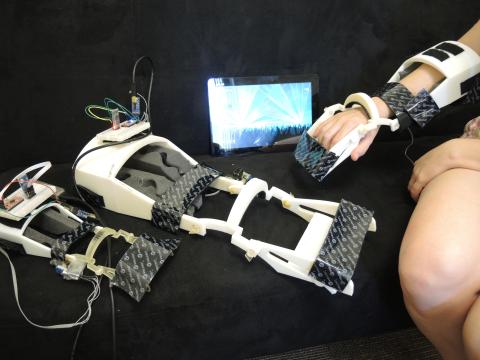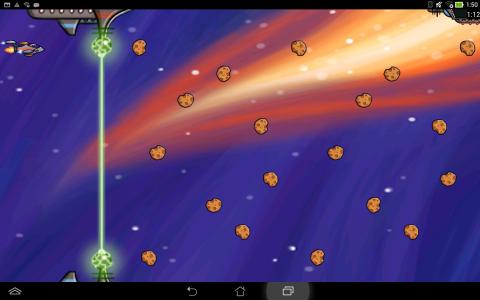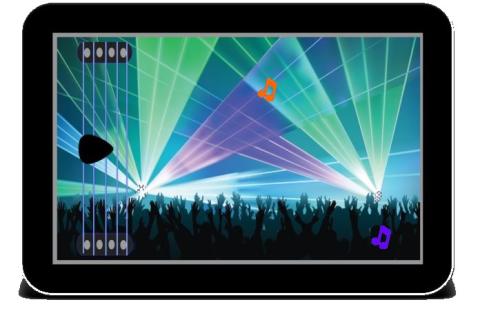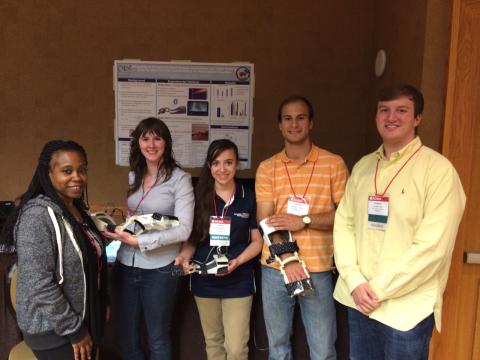As an undergraduate computer engineering major, English joined the Opportunity Research Scholars (ORS) program. Now English’s graduate research is an ORS project and she is mentoring a fresh new crop of undergraduates.
Ph.D. student Brittney English had her first experience with robotics the summer after her freshmen year at Georgia Tech. Previous high school internships at Air Force Research Labs at Tyndall Air Force Base in her hometown of Panama City, Florida, sparked her love of science, but work on the Pyrocopter project, a robotic helicopter that shot flaming paint balls in order to do controlled burns in forest areas, ignited her interest in robotics.
As an undergraduate computer engineering major, English joined the Opportunity Research Scholars (ORS) program in the School of Electrical and Computer Engineering (ECE) at Georgia Tech. The ORS program is an academic enrichment program that matches two or three undergraduate ECE students with a Ph.D. mentor. Undergraduate students broaden on their coursework and apply their skills to real research projects under the guidance of a faculty advisor and graduate mentor during the course of their studies.
Already fascinated by robotics and space applications from her work at Tyndall, English chose an ORS project in Professor Ayanna Howard’s lab. Her team developed software that allowed a robot to create high-definition topographic maps of Mars and other locations where GPS isn’t an option. When English decided to attend graduate school, the in-depth research under Howard’s tutelage caused her to narrow her focus to robotics, in particular rehabilitative and assistive robotics—a specialization of Professor Howard’s, who now serves as English’s Ph.D. advisor.
Now English’s graduate research is an ORS project and she is mentoring a fresh new crop of ECE undergraduates.
“When I was an undergraduate, I benefitted greatly from the ORS program. I was exposed to research in academia for the first time; received guidance with classes, research, and scholarships from my mentor; completed my first publication in an IEEE conference; and got a sneak peek into the life of a graduate student. I decided to become an ORS mentor in order to give similar opportunities to other undergraduate students,” English said.
Her team, consisting of computer engineering major Jennifer Hunter, and electrical engineering majors Jonathan Tuck and Gueorgui Tzintzarov, recently attended the Rehabilitation Engineering and Assistive Technology Society of North America (RESNA) Conference where they were finalists in the Student Design Competition for their Robotic Exoskeleton and Tablet Gaming Suite device.
“This was an excellent experience for the undergraduates, because it awarded them a publication, experience presenting at a conference, and networking opportunities with other experts in the field,” English said.
Their wearable device, which fits over the wrist and arm and pairs with an interactive game on a tablet, facilitates physical therapy for patients with limited motor function. It also makes therapy more fun for patients that need to regain strength in their wrists and hands—a key factor in perceived quality of life—allowing them to do exercises at home and keeping them engaged for longer than traditional physical therapy sessions.
While wearable robotic prosthetics exist for use in rehabilitation, English’s technology takes them to a new level. Hers is the first solution that is available in more sizes than the current one-size-fits-all wearable that is only effectively used by the average adult male. Because the device’s exoskeleton is 3-D printed, it can be sized for all types of patients, including children. In the future, the hope is that a medical professional can input specific measurements and print out a customized exoskeleton for each user.
While participation in ORS has afforded the undergraduates unique opportunities in the world of research, English has also benefitted. Each student took an active, hands-on role in the research. Tuck and Tzintzarov used Solidworks software to design the exoskeletons and printed them in the Invention Studio. Hunter used Java and Android Studio to develop two interactive games, Robo Blaster and Robo Rock ‘n Roll, that pair with the devices.
“As an ORS Ph.D. mentor, I wanted to give back and give undergraduates some of the same opportunities I had. It turns out that having these students on my research team has been invaluable. They each brought a unique perspective and specific skills to the table. I only hope I’ve taught them as much as they have taught me,” English said.
Additional Images



